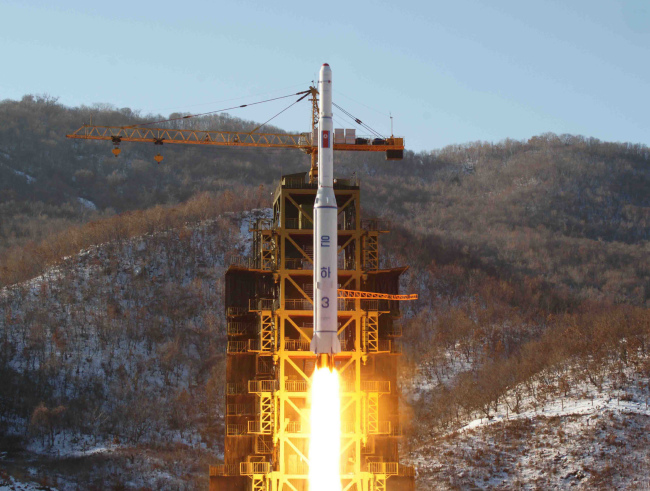북한은 23일 한반도 비핵화를 위한 방침을 끝낼 것을 선포하며 물리적 대응조치를 언급해, 핵실험 가능성을 시사했다. 이는 유엔 안전보장이사회가 작년 12월 있었던 북한의 장거리 로켓 발사에 대한 대북제제 결의 채택에 반발한 것으로 보인다.
 |
유엔 안전보장이사회는 22일 오후(현지시간) 북한에 대해 작년 12월 장거리 로켓 발사를 비난하고 제재를 확대ㆍ강화하는 내용의 결의(2087호)를 만장일치로 채택했다. 사진은 작년 12월12일 평안북도 철산군 동창리 서해위성발사장에서 `은하 3호` 로켓이 발사되는 모습. (연합뉴스) |
<관련 영문 기사>
N. Korea vows to end denuclearization efforts
By Song Sang-ho
North Korea on Wednesday vowed to end denuclearization efforts and hinted at a third nuclear test in an angry response to a new U.N. Security Council resolution condemning its December rocket launch.
Pyongyang’s foreign ministry issued the statement less than two hours after the UNSC adopted the Resolution 2087, which called for expanding and toughening existing sanctions and warned of “significant action” in case of additional provocations.
“Due to the U.S.’ worsening policy of hostility toward North Korea, the six-party talks and the joint Sept. 19 statement were rendered null and the denuclearization of the Korean Peninsula was put to an end,” said the statement carried by the state-run Korean Central News Agency.
“There will be no more discussion over the denuclearization of the Korean Peninsula in the future although there will be talks for securing peace and security in the peninsula.”
The joint statement, issued after the fourth round of six-party denuclearization talks in 2005, stipulates that Pyongyang will discard its nuclear programs in steps and return to the Treaty on the Non-Proliferation of Nuclear Weapons.
The North’s foreign ministry also warned of “physical action” to strengthen self-defense capabilities including nuclear deterrence, which reinforced the speculation that it would conduct another underground atomic test in the near future.
Seoul expressed regret over the statement, calling on the North to abide by the new UNSC resolution.
“It is very regrettable (that the North hinted at a third nuclear test). The North should pay attention to the UNSC resolution unanimously adopted,” Seoul’s Foreign Ministry spokesperson Cho Tai-young told reporters.
“The (Seoul) government will have close consultation with major concerned countries regarding it while keeping close tabs on North Korea’s movements.”
President Park Geun-hye’s transition team called on the North to refrain from further raising tensions.
“We urge North Korea not to take measures that would worsen the situation including a third nucleat test,” its spokesman Yoon Chang-jung said.
Some Seoul officials said that the North’s reaction was at the “expected level,” stressing the South leaves all the possibilities open.
“Since last year, we have been preparing for all possibilities and maintaining a strong readiness against them,” an official said, declining to be named.
Seoul believes the North has already completed preparations for another nuclear test in the Punggye-ri test site in the country’s northeast, where it carried out two nuclear tests in 2006 and 2009.
In addition to the UNSC resolution, Seoul and Washington are mulling applying their own additional sanctions to punish Pyongyang for its successful launch of a long-range rocket in December through close consultation.
Seoul’s chief nuclear envoy Lim Sung-nam and Glyn Davies, Washington‘s special representative for North Korea Policy, are set to meet on Thursday to discuss the bilateral sanctions. Davies was to arrive in Seoul on Wednesday.
The sanctions the allies could take include imposing tougher maritime sanctions on North Korean ships suspected of weapons trafficking or stepped-up financial sanctions on the communist regime, observers said.
Pyongyang’s renouncement of the denuclearization efforts poses a challenge to the incoming South Korean President Park Geun-hye, who has pledged to enhance strained inter-Korean ties through her so-called peninsular trust-building process.
Experts largely believe that should the North push for another nuclear test, Seoul and Washington might find it difficult to adopt a coordinated softer-line policy. They say that the North is likely to push for the test unless the U.S. and the South make active diplomatic efforts to persuade it.
“The North may push for the test as it regards the new sanctions as an attack on its sovereign right (to develop space programs), seeks to raise stakes in future nuclear negotiations with the international community, and could believe that it has nothing more to lose given the continuing international sanctions,” said Kim Ho-sup, international politics professor at Chung-Ang University.
(sshluck@heraldcorp.com)




![[Exclusive] Hyundai Mobis eyes closer ties with BYD](http://res.heraldm.com/phpwas/restmb_idxmake.php?idx=644&simg=/content/image/2024/11/25/20241125050044_0.jpg)
![[Herald Review] 'Gangnam B-Side' combines social realism with masterful suspense, performance](http://res.heraldm.com/phpwas/restmb_idxmake.php?idx=644&simg=/content/image/2024/11/25/20241125050072_0.jpg)

